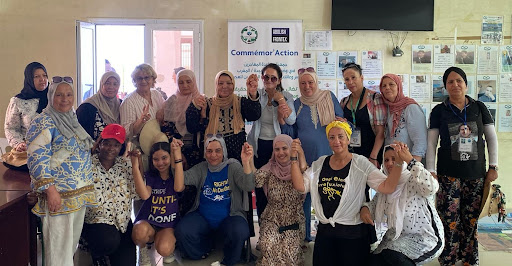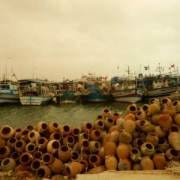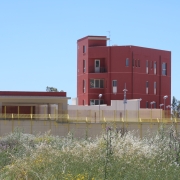Joint Statement calling for the dismissal of UNHCR’s special envoy Vincent Cochetel
Article first published on September 10, 2022
On Tuesday, 6 September 2022, while families of the disappeared and deceased at EU borders came together for a protest action in Zarzis, Tunisia, Vincent Cochetel, the UNHCR’s special envoy for the Western and Central Mediterranean sent out a tweet:
“Grieving for the loss. But the same mothers had no problem encouraging or funding their children to embark on those dangerous journeys. Like in Senegal, symbolically prosecuting parents for putting at risk their children could trigger serious attitudinal change on death journeys.”
Blaming mourning mothers, some of whom have searched for answers for over a decade, and even calling for their criminalisation through ‘symbolic prosecution’ is simply outrageous. In this joint statement, we want to denounce Mr Cochetel’s words in the strongest of terms. Mr Cochetel sent his tweet as a response to a ‘CommemorAction’, a large gathering in Zarzis that brought together the families of the disappeared, local fishermen, as well as activists from Africa and Europe. While the mothers, who are deeply traumatised, were publicly demanding answers, Mr Cochetel insulted them by making them responsible for their sons’ disappearance.
Some of the mothers and sisters of the disappeared have responded to Mr Cochetel:
Jalila Taamallah (mother): It is the visa and border system that has put migrants in danger, not their mothers. It is the fault of migration policies that cause the deaths of people crossing the Mediterranean. Therefore we will continue to participate in the demonstrations for freedom of movement. You can’t kill our demand for truth and justice.
Hajer Ayachi (mother): It should be a shame to accuse mothers and sisters of missing migrants who have lost their loved ones of being responsible for their deaths. We have been fighting against governments since 2011 to show that it is migration policies that endanger the lives of our sons, not us. Every time the authorities deny their responsibility our sons die for a second time.
Gamra Chaieb (mother): We, the mothers of the disappeared, consider it a great shame that we are given the responsibility for the death of our sons. Our sons are victims and so are we, without any response from the governments and the visa system. They are the criminals, they pushed our sons to leave because they were in misery and then they abandoned us. My son left because he was sick with cancer. He just wanted to get well and live for his family and his little daughter.
Samia Jabloun (mother): I believe that this man is sick because never a mother pushes her son to immigrate. He is not humanitarian, he does not feel our pain, the policies of the “third world countries” are responsible and also the European Union which takes advantage of the wealth of these countries and makes them poor, for this reason the young people are unemployed, the poverty which pushes them to immigrate to improve their standard of living.
Awatef Daoudi (mother): If our children go to sea it is to do good to their families because in their country they are badly treated and badly paid and there is always segregation. Those who have money have the power and can do whatever they want even for visas, these are the businessmen and politicians, but most of the young people do not have rights and that is why they throw themselves into the water. In both cases, either at sea or in their country, they are dead. But unfortunately it is a shame that our government does not want to keep our young people well.
Nourhene Khenissi (sister): Before attacking the mothers of the disappeared, it would have been better if you had criticised the Tunisian and Italian states, especially the European Union, because it is the first and last cause of all these tragedies. And know that freedom of movement and travelling is a right for every human being.
Besbes Sarra (sister): It’s not true what he wrote about the mothers of the missing migrants, there are no families who throw their sons into the sea which represents hell and danger. So you don’t have the right to judge the feelings of the family because the relationship between the mother and her son is not just a word but it is more than that. You have to know that especially the relationship between all the members of the family is intimate because the son for the mother replaces the father, for the sister the brother represents the second father and all the supports of life, for the father the son represents the person who is the first responsible for the family during his absence and for the brother he is the help and the power. Finally, it is important to know that if a member of the family is absent, the whole family will be devastated.
Rania Abdeltif (sister): The mother will not put her son in danger, on the contrary, the mother wants her son to always be by her side, but the young people did not have a chance in their country, so they decided to emigrate to improve the life of their family. The mothers will never abandon their children, they are now fighting for their missing children. The feeling of a mother or sister losing her son or brother is a very painful feeling that no one will understand unless they live it.
Instead of blaming the EU border and visa regime, instead of denouncing the deadly migration policies of Europe, Mr Cochetel chose to blame the victims, turning them into perpetrators. This is unbearable and we are astonished: how can such a person remain in the position of a high-level official at the UNHCR?
We acknowledge that Mr Cochetel has apologised and we also appreciate that the UNHCR has apologised for the statement of their special envoy. Nonetheless, and not least as Mr Cochetel has made unacceptable remarks already in the past, we believe that this is not enough. We call on the UNHCR to take action and to dismiss their special envoy or for Mr Cochetel to resign.
Importantly, we believe that the UN agency’s problems are not solved through the dismissal of an individual. The UNHCR as a whole has deep institutional flaws and has time and again failed those it claims to protect. The behaviour of the UNHCR toward vulnerable groups in places such as Libya and Tunisia, and the appalling response of their staff to refugee protests there, highlight some of the many severe shortcomings of this UN agency.
_______________________________________________________________________________________________________________________
Le mardi 6 septembre 2022, alors que les familles des personnes disparues et décédées aux frontières de l’UE se réunissaient pour une action de commémoraction et de protestation à Zarzis, en Tunisie, Vincent Cochetel, envoyé spécial du HCR pour la Méditerranée occidentale et centrale publiait le tweet suivant:
«Nous pleurons leur perte. Mais ces mêmes mères n’ont eu aucun problème à encourager ou à financer leurs enfants pour qu’ils se lancent dans ces voyages périlleux. Comme au Sénégal, poursuivre symboliquement les parents pour avoir mis en danger leurs enfants pourrait entraîner de sérieux changements d’attitude envers ces voyages mortels.»
Blâmer les mères en deuil, parmi lesquelles certaines cherchent des réponses depuis plus de dix ans, et aller jusqu’à appeler à leur criminalisation au moyen de “poursuites symboliques” est tout simplement scandaleux. Dans cette déclaration commune, nous condamnons fermement les propos de M. Cochetel. Celui-ci a envoyé son tweet en réponse à une “CommemorAction”, grand rassemblement à Zarzis réunissant les familles de disparu.e.s, des pêcheurs locaux, ainsi que des militant.e.s venu.e.s d’autres pays d’Afrique et d’Europe. Alors que les mères, profondément traumatisées, réclamaient publiquement des réponses, M. Cochetel les a insultées, les rendant responsables de la disparition de leurs fils.
Certaines mères et sœurs de disparu.e.s ont répondu à M. Cochetel:
Jalila Taamallah, mère: C’est le système de visas et de frontières qui a mis en danger les migrant.e.s, pas leurs mères. C’est la faute des politiques migratoires, ce sont elles qui provoquent la mort des personnes qui traversent la Méditerranée. C’est pour cela que nous continuerons à participer aux manifestations pour la liberté de circulation. Vous ne pouvez pas tuer notre demande de vérité et justice.
Hajer Ayachi, mère: On devrait avoir honte d’accuser des mères et des sœurs des migrant.e.s disparu.e.s qui ont perdu des êtres chers, en les rendant responsables de leur mort. Nous combattons depuis 2011 les gouvernements pour démontrer que ce sont les politiques migratoires qui mettent en danger la vie de nos fils, pas nous. Chaque fois que les autorités nient leurs responsabilités, nos fils meurent une deuxième fois.
Gamra Chaieb, mère: Nous les mères des disparus, on considère comme étant une grande honte le fait de nous faire porter la mort de nos fils. Nos fils sont des victimes et nous aussi, victimes du système de visa et des gouvernements qui nous laissent sans réponses. Ce sont eux qui sont des criminels, ils ont poussé à partir nos fils parce qu’ils étaient dans la misère et après ils nous ont abandonnées. Mon fils est parti parce qu’il était malade du cancer. Il voulait juste guérir et vivre pour sa famille et sa petite fille.
Samia Jabloun, mère: Je crois que cet homme est malade, car jamais une mère ne pousse son fils à immigrer. Nous avons le cœur brisé, cet homme n’est pas un humanitaire, il ne sent pas nos douleurs. Ce sont les politiques des pays du « tiers monde » qui sont responsables, et aussi l’Union européenne qui profite des richesses de ces pays et les appauvrit. C’est pour cela que les jeunes sont au chômage. C’est la pauvreté qui les pousse à immigrer pour améliorer leur niveau de vie.
Awatef Daoudi, mère: Si nos enfants partent en mer c’est pour soulager leurs familles et parce que dans leur pays, ils sont maltraités, mal payés et partout il y a de la ségrégation. Ce sont ceux qui ont de l’argent qui ont le pouvoir, ce sont eux qui peuvent obtenir des visas, les hommes d’affaire, les hommes politiques… mais la plupart des jeunes n’y ont pas droit et c’est pour cela qu’ils se jettent dans l’eau. Que ce soit en mer ou dans leurs pays, c’est comme s’ils étaient morts. C’est une honte que notre gouvernement ne prenne pas soin de nos jeunes.
Nourhene Khenissi, sœur: Avant de s’en prendre aux mères de disparu.e.s, il aurait mieux valu que vous critiquiez les États tunisien et italien, notamment l’Union européenne, car ce sont eux qui sont les premières et dernières causes de tous ces drames. Et sachez que la liberté de mouvement et d’itinérance est un droit pour tout être humain.
Besbes Sarra, sœur: Ce qu’il a écrit sur les mamans de migrant.e.s disparu.e.s n’est pas vrai, il n’y a pas de familles qui jettent leurs fils dans la mer, cela représente l’enfer et le danger. Vous n’avez pas le droit de juger les sentiments de la famille, parce que la relation entre la maman et son fils, ce n’est pas juste un mot, c’est bien plus que ça. Il faut surtout savoir que la relation entre tous les membres de la famille est intime, le fils pour la mère remplace le père, pour la sœur, le frère représente le deuxième père et tous les soutiens de la vie, pour le père, le fils représente la personne qui a la responsabilité de la famille pendant son absence et pour le frère, il est l’aide et le pouvoir. Enfin Il faut savoir si un membre de la famille s’absente, toute la famille sera bouleversée.
Rania Abdeltif, sœur: La mère ne mettra pas son fils en danger, au contraire, la mère veut que son fils soit toujours à ses côtés. Mais les jeunes n’ont pas eu de chance dans leur pays, c’est pourquoi ils ont décidé d’émigrer pour améliorer la vie de leur famille. Les mères n’abandonneront pas leurs enfants et se battent maintenant pour leurs enfants disparus. Le sentiment d’une mère ou d’une sœur qui a perdu son fils ou son frère est un sentiment très douloureux que personne ne comprendra à moins de le vivre.
Au lieu de blâmer le régime européen des frontières et des visas, au lieu de dénoncer les politiques migratoires meurtrières de l’Europe, M. Cochetel a choisi de blâmer les victimes, faisant d’elles les responsables. Ceci est insupportable et nous nous interrogeons : comment une telle personne peut-elle rester dans sa position de haut fonctionnaire du HCR ?
Nous reconnaissons que M. Cochetel s’est excusé et nous apprécions également que le HCR ait présenté des excuses suite à la déclaration de son envoyé spécial. Néanmoins, et notamment dans la mesure où M. Cochetel a déjà tenu des propos inacceptables dans le passé, nous pensons que cela est insuffisant. Nous appelons le HCR à agir et à révoquer son envoyé spécial, ou appelons M. Cochetel à démissionner.
Par ailleurs, nous pensons que les problèmes de l’agence des Nations Unies ne seront pas résolus par le licenciement d’un individu. Le HCR dans son ensemble présente de profondes lacunes au niveau institutionnel, en abandonnant à maintes reprises celles et ceux qu’il prétend protéger. Le comportement du HCR envers les groupes vulnérables en Libye et en Tunisie, et la réaction indécente de son personnel face aux manifestations de réfugié.e.s dans ces pays, mettent en évidence de manière certaine les manquements graves de cette agence onusienne.
09/09/2022






